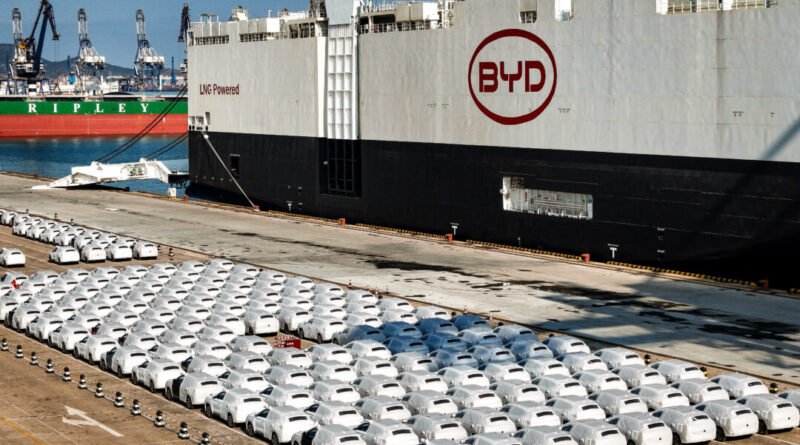Possible Impact of Planned Electric Vehicle Factory in Turkey on the UK Market
Jim Saker, professor at the Loughborough University, said UK car makers will find it very difficult to compete if BYD can avoid export tariffs.
Chinese electric car maker BYD’s plan to make 150,000 cars a year in Turkey could allow the company to avoid tariffs, making it “a lot easier” to export to the UK and elsewhere.
Bypassing tariffs would also make it “very, very difficult” for domestic manufacturers to compete with the Chinese brand, says Jim Saker, professor at the Loughborough University.
BYD’s Turkey move came hot on the heels of an EU decision to impose tariffs of up to 37.6 percent on Chinese-manufactured electric vehicles (EVs), and meanwhile, the UK is debating whether it should take similar steps.
The $1 billion (£77o million) investment deal on building a factory in Turkey, signed on July 9, could also help BYD avoid higher tariffs that the United States has imposed on Chinese EVs, Mr. Saker told The Epoch Times.
According to the Turkish government, BYD will build a production facility for electric and plug-in hybrid cars, with the capacity to manufacture 150,000 units annually, and a sustainable mobility and R&D centre.
If BYD exported cars to the UK from a Turkish plant, the company could take advantage of the zero-percent tariff rate, but only if it meets the rules of origin, meaning an assembly plant putting together made-in-China parts would not qualify for the discount.
And if the company manages to bypass the tariff, it would spell great difficulties for British manufacturers, Mr. Saker said.
“If it was a manufacturing plant, which produced the right-hand drive cars, and the cars met with all the country-of-origin requirements, then it would make the entry of BYD vehicles into the UK a lot easier,” he said.
That will make it “very, very difficult” for British manufacturers to compete, he added.
“BYD vehicles, which are currently being priced at £28,000—coming in with a tariff—could be reduced in price to £13,000, and they can still make profit. They are very, very competitive.”
An eight-month investigation by the EU found Chinese EVs benefit from “unfair subsidization,” which is causing “a threat of economic injury to EU battery electric vehicles producers,” said European Commission’s Vice President, Margaritis Schinas, as the bloc slapped additional tariffs of up to 38.1 percent of tariffs on Chinese EV imports, including a 17.4-percent tariff on BYD vehicles last month.
The tariffs, which take effect in July, also affect non-Chinese brands that have factories in China, such as U.S. brand Tesla and German automakers.
However, a factory in Turkey could allow the company to bypass the rate because Turkey is part of the EU Customs Union.
In the UK, the previous government has not committed to imposing more tariffs on Chinese EVs, but promised to launch an anti-subsidy probe if the industry calls for it.
Mr. Saker said he suspects the Labour government, which has gestured toward more collaboration with the EU, will likely align the UK’s tariffs with the bloc.
“They could go the American route, I suppose, but that would be politically difficult to handle with Europe,” he said.
In May, U.S. President Joe Biden ordered the quadrupling of the tariff rate on Chinese EVs from 25 percent to 100 percent.
Officials later announced increased customs duties on a range of Chinese imports, including, EVs, EV batteries, computer chips, and medical supplies, that will take effect in August.
Dorothy Li contributed to this report.





